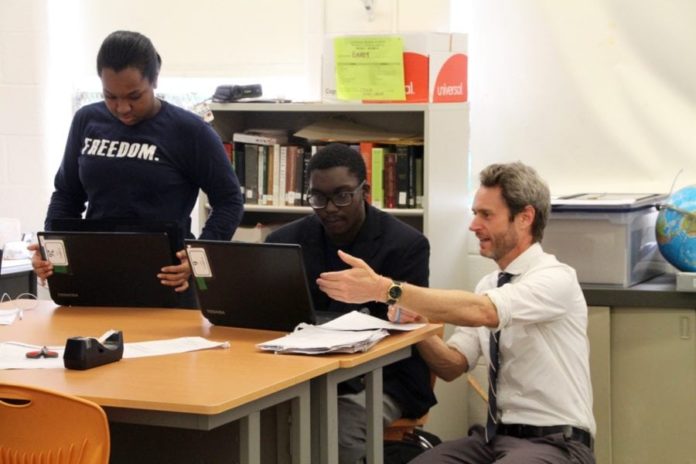A Memphis educator who frequently teaches about Martin Luther King Jr. says his students have taught him as much about civil rights as they’ve learned from him.
Kyle Grady, a 12th-grade government and economics teacher, said the activism he has seen among his students has been inspiring. He points to their involvement in the recent March for Our Lives protest against gun violence as an example.
“I feel like my students have been preparing me to celebrate the life of Dr. King,” Grady said. “They’re reminding me that the civil rights movement isn’t over, but it’s really coming back in student activism. As an adult, I don’t own legacy of the civil rights movement or Dr. King. It belongs to the next generation, and they decide how to build upon it.”
Grady was a philosophy professor at Rhodes College in Memphis before switching to teach in K-12. For the last three years, he has taught government and economics at Freedom Preparatory Academy, one of Memphis’ highest-performing charter networks.
We asked Grady about how he incorporates King’s life into his classroom, especially during the year that marks the 50th anniversary of his assassination in Memphis, as well as how he uses Memphis 1968, free curriculum from the education group Facing History and Ourselves. (This Q&A has been lightly edited and condensed for clarity.)
What is one of your favorite lessons to teach about the civil rights movement?
One thing I did this year in my government class that I really enjoyed was to have my students write a political manifesto. A lot of the academic papers my students write deprive them of their voice, and this was a way to encourage them to own their own voice. I want to encourage them to learn about government, not just about how it works, but to see themselves as potential agents of change. Writing a manifesto forces them to take what would be otherwise abstract academic concepts and think about how they could have an impact on the world around them.
Asking them to write a manifesto is a challenge because most have never been introduced to that concept. So we started with some examples, and one they are really familiar with: the Declaration of Independence. Then I showed them the Black Panther Party’s Ten-Point Program. This is a powerful way, I think, to draw on work of the civil rights movement.
How is the upcoming anniversary bringing MLK to life for your students? Did they already know a lot about his story? What did they not know?
We did a unit on the theory of capitalism and Marxism. To bring that down out of the clouds, we used the Memphis sanitation workers strike and the anti-poverty campaign of the later years of Dr. King’s life. We can relate this to what’s happening in Memphis right now.
Most of my students have this picture in their heads of King as passive, non-violent resistance, and don’t understand the full depth of his economic interests. Yes, you can get voting rights, but if you’re economically disenfranchised, you’re no better off.
I think my students walk away with an understanding — it might sound obvious, but it’s eye-opening to them — that poverty is not an individual issue but a cultural problem. They have a responsibility, not just to lift themselves and their family out of poverty, but to care about the economic freedom of those around them. It’s helpful for them to study economics, the civil rights movement, and the life of King all together to help deepen their understanding that freedom is not just about appealing to government for new laws or electing someone aligned to their beliefs. Rather, every decision we make in lives and communities has an impact on our own economic freedoms and that of those around us.
How do you view other textbooks or curriculums related to the civil rights movement?
One of my favorite texts is Dr. King’s Letter from a Birmingham Jail. I love it as a teacher, because I think he’s modeling what using your own education looks like. To write this letter, he’s metaphorically taking books down off his shelves and reading through them. He’s using his education in a moment of political and personal crisis. That’s what I would love for my students, and all students, to be able to do — not just answer teachers’ questions but take their wealth of information and use it in a totally creative way. That’s what Dr. King did. He drew on disparate sources to show the gravity of the project, and that the movement was not just about this group of people in this moment of time, but about universal themes of humanity.
Tell us about the Teaching Memphis 1968 curriculum. How has it enhanced your instruction?
I’m not from Memphis originally, I came here to work at Rhodes from California. Before reading this curriculum and attending the sessions on it, I didn’t understand how the events of 1968 impacted the way Memphians viewed themselves.
I had no idea that many Mempians had this false sense that Memphis was ahead of the rest of the South when it came to integration, and that Memphis prided itself as not having much racial tension prior to the strike. I brought these lessons into my classroom when we were doing a unity on community — what strengthens and what threatens people’s sense of community.
We used Memphis in 1968 and prior as an example of how communities carry around a sense of identity that can be out of sync with reality. Sometimes, it’s these moments of crisis that tell us who we are. It’s only when our communities break down that we see how they really worked, right?
The post How one Memphis teacher brings the lessons of MLK to life – and how his students teach him back appeared first on Chalkbeat.




